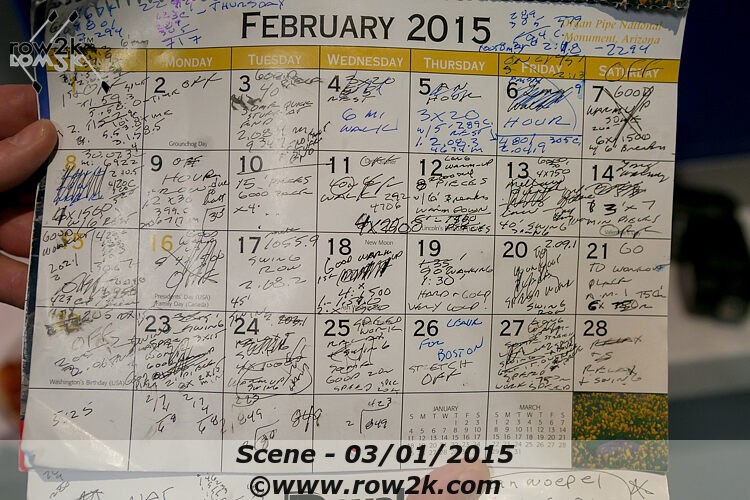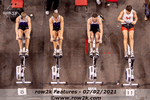Time Management Part 2 - Tips, Sleep, and Recovery

Following the cancellation of the 2020 spring racing season, row2k solicited the collegiate coaching community to engage in a variety of high-level topics within the profession. We submitted over sixty questions across a dozen topics and thank the coaches and staffs that found time to contribute their thoughts during this stressful time.
This week we focus on the topic of Time Management with the following questions:
WHAT TIME MANAGEMENT TIPS AND TRICKS HAVE YOU FOUND MOST HELPFUL FOR COLLEGIATE ROWERS?
CLAIRE MARTIN-DOYLE – MIT LIGHTWEIGHT WOMEN
Write everything down! All classes, practices, commitments, everything. When a student sees how full their days are, it can influence them to re-evaluate adding on an extra class or another extracurricular. Also, keeping track of sleep, and stress level on a daily basis is impactful. When an athlete sees that her sleep schedule is disrupted over a number of days, or weeks, it can serve as an inspiration to better manage time. This can be even more powerful if you show an athlete the impact lack of sleep or immense stress has on performance. For example, if a rower sleeps 4-5 hours, 2 nights in a row and her splits on a workout are way off, that’s an easy argument to make for better time management.
BRIAN PERKINS – TEMPLE MEN
We use a simple word doc calendar that has the entire semester on one page. The athletes are required to get their syllabi and populate the page with every due date and important date (the races are already filled in). They then have to show it to me and post it somewhere visible. Now if they miss a deadline in April, THEY know that I know that THEY knew it was coming in January. This creates accountability and sense of urgency.
BART THOMPSON – ADRIAN
I emphasize over-planning their schedule initially, to the point that—when I’m first working with a rower who is trying to improve their scheduling, I ask them to schedule out their entire schedule, from waking up until going to bed. We start with class, practice, and mealtime; then studying time; and lastly, they even plan out their social/free time.
EMILIE GROSS – NORTH CAROLINA WOMEN
I think it’s important to start teaching this prior to them even stepping foot onto campus. It starts with them understanding how their first semester they need to be a student-athlete and put those two items onto their plates (that being academics and athletics), then as they excel, they can start to add more and more onto their plates each semester. When our student-athletes add to their plates properly, by the time they are seniors they are able to successfully manage being a student-athlete, but they also have added items to their plates like research projects, internships, and other campus community clubs.
GABE WINKLER – OREGON STATE MEN
There is a lot of trust on our team and we do some of the erg workouts on their own. Particularly we do a 10K for score every Friday morning. But this can be done on their schedule. The only parameters is that it has to be done before 12:00pm. This allows them to be able to sleep in if they want to. Some guys have 8:00am class on Fridays and they’ll do it at 6:00. That’s great but it isn’t for everybody.
JENN LANGZETTEL – DUQUESNE WOMEN
You do not need to and cannot study for 4 or 6 hours straight and trying to stay up studying until 1 am, go to practice, then go back and take a 2-hour nap is not beneficial. The time is there to get everything done and get enough sleep, you just have to recognize that.
ETHAN SHOEMAKER – STETSON
In cases where the student-athlete seems completely lost, our coaching staff has sat down with them and scheduled out their whole weeks with them. This is one of the benefits of being a smaller team, we have time to dedicate to this. Most often the rower feels overwhelmed when they are thinking about their schedule in its entirety, but after they put everything down on paper, they start to see the gaps and the free time they actually have, and they feel a little better. By writing out one whole week, the student-athlete also typically can see where they may not be using their time most effectively and can adjust accordingly.
ANONYMOUS HEAD COACH
You don’t need to keep people four hours per day just because you are allowed to. Be efficient with your time and treat your athletes like you would want to be treated. I have talked to a lot of coaches who have said they would never have trained as much as they are expecting from their teams. That is a terrible example to teach.
CAMPBELL WOODS – MARIST MEN
GO. TO. CLASS. Athletes who struggle usually do so because they are choosing not to attend classes. You need to show up to succeed. I also push my athletes to always leave their dorms to study. Every campus has a student athlete study space, or a great library packed with resources. A focused 1-2 hours at the library will save you hours of distracted half-work at home. Get work done ahead of time to avoid the stressful rush job at the last minute. If you attend 100% of the classes and complete 100% of the homework it is nearly impossible to fail a class.

You will hear lots of coaches say that if you want to be a great student AND a great athlete that you need to sacrifice your social life and I frankly disagree. At Marist we have had men who not only excelled in the class room AND were important members of the varsity eight but also were involved in clubs, academic societies, fraternities, leaders in ROTC and even holding full time jobs and still found the time to have healthy relationships and social lives. Ultimately, I have found that the athletes who manage their time most effectively are also those who train the hardest, get the best grades and find time for a rewarding social life.
LUKE AGNINI – GEORGETOWN HEAVYWEIGHT MEN
Stay ahead of it. It takes a bit of work to stay ahead, but it takes A LOT of work to catch up from behind. What a rowing and life metaphor!
HOW MUCH SLEEP AND RECOVERY SHOULD ROWERS BE GETTING PER DAY TO MAXIMIZE THEIR TRAINING?
JASON BOYD – IONA
The obvious answer is 8 hours a night, but I think for most collegiate rowers they’d have a better chance finding a unicorn than consistently getting 8 hours of sleep.
EMILIE GROSS – NORTH CAROLINA WOMEN
Sleep is important in the recovery process for athletes and can be the first thing to go with young student-athletes. Learning and developing the habits to put sleep as a priority early on in a student-athletes career can be a real game changer.
BRIAN PERKINS – TEMPLE MEN
These athletes should be getting way more sleep than they are. The adverse effects of sleep deprivation are so ubiquitous that no one notices: if we are ALL tired and sore, then we must be ok. Ideally, we are looking for 8 at a minimum and possibly 10-12 hours for athletes. But once you factor in 20 hours of training at a minimum per week, 12 hours of class work, and additional 12 hours of homework (also minimums), then sleep becomes very negotiable. This is unfortunate but it is the reality.
LUKE AGNINI – GEORGETOWN HEAVYWEIGHT MEN
That is such a tough question with college student athletes. The answer is simple. You have two priorities, academics and rowing. If you do those well, you’ll have plenty of time for fun, jobs, internships, relationships and time with friends.
JENN LANGZETTEL – DUQUESNE WOMEN
Ideally women are getting 8 hours of sleep but that, in most times, is not possible with the demands of collegiate academics. We ask for at least 6 hours of sleep per night to maximize training and studying.
CAMPBELL WOODS – MARIST MEN
We workout in the morning at 6am and so our athletes need to be in bed around 9-10pm to be ready for the next day. I think getting your 7-8 hours of sleep AT LEAST is key and you can’t make that up with naps during the day.
BART THOMPSON – ADRIAN
In a perfect world I would love it if all of our rowers got 8 hours of sleep every night; that is the goal. Realistically, though, I know that very few of them achieve that regularly.
ETHAN SHOEMAKER – STETSON
I am not a sleep therapist, nor am I well educated on sleep and recovery. What I do know comes from experience. Athletes who are sleeping on a regular and predictable schedule are often doing the best. The total hours of sleep may vary depending on the athlete and what they can reasonably afford, but if they are consistent from night to night on when they go to sleep and when they wake up, they typically seem to do better. Of course, anything less than 8 hours regardless seems to be too little rest.
Recovery, on the other hand, is different. That should be done when necessary. We emphasize that they should only train 6 days per week. Use one day a week to allow your body to rest and rebuild. This is very important to proper training. One thing that isn’t mentioned in this question, but I want to address because it is related, is the subject of nutrition. This is perhaps the most important part of training. Sleep, and recovery is important, but without proper fuel, your body won’t recover as it should. Our athletes probably struggle with proper nutrition more than anything else, and it is something we are dedicated an ever-increasing amount of our time going over with them.
GABE WINKLER – OREGON STATE MEN
8+ hours. If they are getting less than this, they will get sick, break down, and not improve.
CLAIRE MARTIN-DOYLE – MIT LIGHTWEIGHT WOMEN
The recommended standard from most experts is 8 hours of sleep per night. However, with the demanding workload of the collegiate athlete, this isn’t always possible. I encourage my athletes who have sleep deficiencies, to catch up whenever they can with naps – even though this isn’t ideal, it’s better than nothing!
In terms of recovery, this varies wildly depending on the athletes.
Keeping track of individual athletes’ level of fatigue, muscle soreness, consistency in wattage output, and sleep quality is important to knowing if an athlete is recovering between workouts.
If you enjoy and rely on row2k, we need your help to be able to keep doing all this. Though row2k sometimes looks like a big, outside-funded operation, it mainly runs on enthusiasm and grit. Help us keep it coming, thank you! Learn more.
Comments | Log in to comment |
There are no Comments yet
| |
- Bont Rowing
- Calm Waters Rowing
- Concept 2
- Craftsbury Sculling
- The Crew Classic
- CrewLAB
- Croker
- Durham Boat Co.
- Empacher
- Faster Masters
- Filippi
- Fluidesign
- h2row.net
- HUDSON
- Live2Row Studios
- Nielsen-Kellerman
- Oak Ridge RA
- Peinert Boat Works
- Pocock Racing Shells
- Race1 USA
- RowKraft
- Rubini Jewelers
- Vespoli USA
- WinTech Racing
- Bont Rowing
- Calm Waters Rowing
- Concept 2
- Craftsbury Sculling
- The Crew Classic
- CrewLAB
- Croker
- Durham Boat Co.
- Empacher
- Faster Masters
- Filippi
- Fluidesign
- h2row.net
- HUDSON
- Live2Row Studios
- Nielsen-Kellerman
- Oak Ridge RA
- Peinert Boat Works
- Pocock Racing Shells
- Race1 USA
- RowKraft
- Rubini Jewelers
- Vespoli USA
- WinTech Racing


















